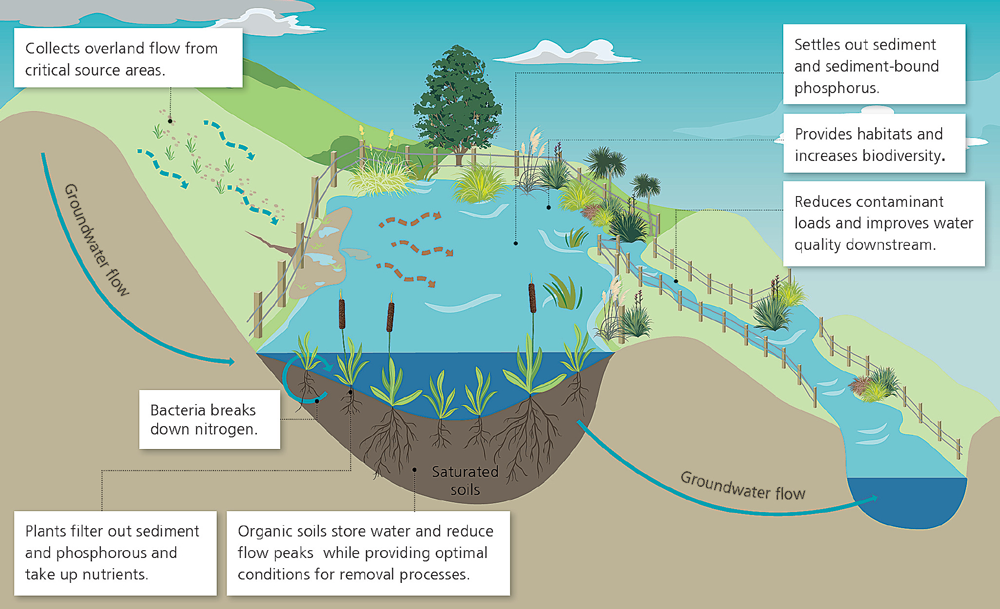Waikato dairy effluent breaches lead to $108,000 in fines
Two farmers and two farming companies were recently convicted and fined a total of $108,000 for environmental offending.
In managing contaminants on your farm, part of the solution might be right under your nose. DairyNZ environment manager Dr David Burger explains.
Bogs, swamps and seeps: these permanent or seasonally wet areas can all be classed as wetlands.
Historically, farmers have drained these wet areas to make their farms more productive but we now know that wetlands can play an important part in reducing our environmental footprint. In short, the benefits of protecting wetlands can outweigh those of gaining extra grazing space.
How wetlands work
Throughout New Zealand, wetlands support the greatest concentration of plants of any natural habitat. They help reduce flooding by acting as a sponge and improve water quality by trapping, filtering and removing contaminants, especially sediment, nitrogen and phosphorus. Protecting, restoring and creating these wetland ecosystems onfarm helps improve downstream water quality.
What is a wetland?
The three most common wetland types on dairy farms are seeps, wet or boggy places in paddocks, and wet areas beside riparian margins. You can recognise them by their location; they are easy to spot when you know what to look for.
Seeps occur at the bottom of hill slopes where groundwater comes to the surface. Seeps can be permanent or seasonal and exist on all soil types.
Wet areas in paddocks are swampy or boggy places where drainage is poor, such as hollows or valley bottoms. These areas could be fed by rainfall or a high water table, and tend to be on heavier soils.
Riparian wetlands are wet or boggy places bordering a waterway.
Whichever kind of wetlands you’re dealing with, managing them more effectively can offer animal welfare benefits and reduce the risk of stock getting stuck. Many farmers find the most satisfying part of managing wetlands is the resulting natural beauty and increase in biodiversity onfarm, particularly birdlife but also native fish and aquatic insects. 
How to manage a wetland
In looking after wetlands, your aim should be to get them to a stage where they can look after themselves with little input from you.
The steps to achieve this are the same for all three wetland types:
Make a plan by using DairyNZ’s Riparian Planner at dairynz.co.nz/riparian-planner.
Keep stock out by fencing.
Don’t drain wetlands; instead ensure their natural hydrology is maintained.
Identify weed and animal pests and control as appropriate.
Plant natives to suppress weeds and to increase biodiversity.
Take advice and keep it legal
If you want to restore or protect a wetland and it involves moving dirt or damming water, you may need consent. Always contact your local regional council or rural professional for advice and assistance. They can help you prepare a wetland management plan, identify potential funding and ensure your plans comply with the regional plan. Several years of weed and pest control may be required, so having a good maintenance plan is essential.
Find out more
For help creating a riparian management plan to fence, plant and protect your waterways, go to dairynz.co.nz/riparian-planner.
To learn more about wetlands in general, visit dairynz.co.nz/wetlands.
Mating wrapped up last month at the across-breed Beef Progeny Test on Pāmu’s Kepler Farm in Manapouri.
Libby Judson is a keeper of memories from an age gone by. Tim Fulton tells her story.
A New Zealand-first native tree study has highlighted the Bioeconomy Science Institute's position as a forestry research leader.
Hemp fibre processor Rubisco is relocating its core processing facility to Ashburton as part of a $20-$30 million expansion to leverage what it says is an accelerating global demand for sustainable and renewable fibres.
Tradition meets some of the latest in technology at the 2026 East Coast Farming Expo.
OPINION: Trade Minister Todd McClay and the trade negotiator in government have presented Kiwis with an amazing gift for 2026 - a long awaited and critical free trade deal with India.
President Donald Trump’s decision to impose tariffs on imports into the US is doing good things for global trade, according…
Seen a giant cheese roll rolling along Southland’s roads?